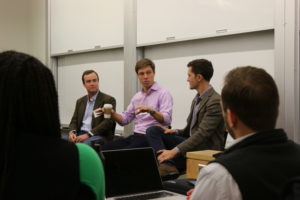By Kara Sherrer
On October 20, the Vanderbilt Entrepreneurs Association (VEA) hosted its second annual Entrepreneur and Investor Symposium. Open to Owen students as well as Vanderbilt undergraduates, the symposium brings in panels of experts to share their real-life experiences in venture capital, search funds, and startups.
Venture Capital Panel
The Panelists: Chris Booker (BS’07) joined Frist Cressey Ventures as a partner in 2016; prior to that, he was a partner at XMi Holdings, Inc. Andrew Goldner is the co-founder of GrowthX and a Kauffman Fellow, a two-year leadership development program for venture capitalists. Jared Winegrad is a principal for the FinTech Growth Fund at Cultivation Capital.
Key Takeaways: Much of the panelists’ discussion focused on increasing gender, racial, and socioeconomic diversity in venture capital. “We’re trying to get the venture capital community to look like the rest of America,” Booker said. “When you’re sitting in the room, and everyone has the same experiences and perspectives, you’re going to miss something,” Winegrad added.
They also gave tips for entrepreneurs seeking venture capital funding for their startup. “The numbers in your model are wrong. I know that with 100% certainty. But I also don’t care…it’s not the actual numbers that matter, it’s the logic that went into it,” Goldner said.
Search Fund Panel
The Panelists: Dan Calano (BS’09) is the principal of Blue Range Capital, a new search fund looking to invest in a single business and grow it long-term afterwards. Jay Davis (BA’03) is a managing partner of Nashton Partners and the CEO of Vector Disease Control International, a mosquito control company that helps cities and counties control diseases such as malaria. Badge Stone is the managing director and co-founder of WSC & Company, another private investment firm interested in acquiring businesses through the search fund model.
Key Takeaways: Search funds have been around since 1984, but they’re not well-known in the entrepreneur community, and few business schools have classes on them. In a search fund, investors identify a promising entrepreneur and pay his/her salary for two years as he/she seeks to locate, acquire, manage, and grow a privately held company. The investor then has the first right of refusal to invest in whatever company the entrepreneur identifies.

Panelists explain the search fund concept
“There are investors looking for talented people. Frankly, I don’t think they care where they come from,” Calano said. “In the background, this search fund community was always there…it is a lot more open than you would ever think. If you pick up the phone, they will talk to you,” Stone added.
Founders/Startups Panel
The Panelists: Rick Apple (MBA, JD’12) is the Chief Operating Officer of Altus UC, which helps businesses unify their communications across phone, desktop, and mobile devices. Becky Sharp (BA’87, MBA’91) is the owner of International Scholarship and Tuition Services, Inc. and the CEO/co-owner of Collegiate Sports Data. Paul Zettler (MBA’14) is the CFO of Groups360, which helps event planners sort through meeting and convention spaces based on criteria like the size of the group or hotel amenities.
Key Takeaways: As alums themselves, the panelists encouraged attendees to take advantage of their time at Owen. “My career in entrepreneurship actually started in this room,” Zettler recalled, referring to Michael Burcham’s Launching the Venture class, which he highly recommended. He also suggested that students take a diverse slate of classes, since startup employees take on so many roles.
The panelists were frank about the low success rate of startups. “A lot of companies fail, don’t get us wrong,” Apple said. Success rate aside, they urged students to try entrepreneurship early in their careers, when the risks are less significant. “You all have that in spades (right now), in terms of being able to take a risk while the fallback is minimal,” Sharpe said. “I think the risk is that once you do go out into the entrepreneur world, you’re never going to want to go back,” Zettler added.